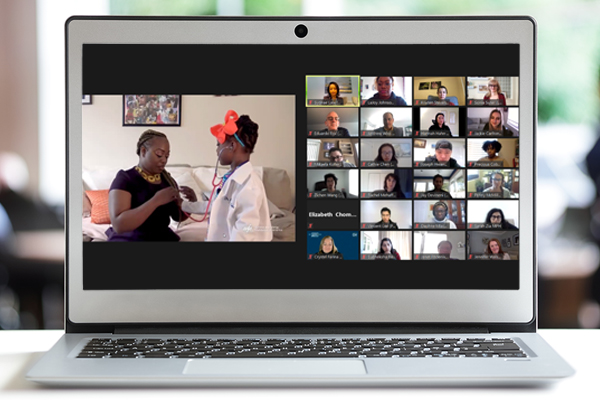In February of 2021, the GW Nursing Office of Community Engagement and the GW Nursing Simulation and Innovation Learning Center partnered with the DC Asthma Coalition, Impact DC Asthma Clinic of Children’s National Health Sciences and the DC Children’s Law Center to host an interprofessional case study simulation entitled “Caring for Children with Asthma”. GW Nursing invited students and faculty of the GW School of Medicine and Health Sciences, the GW Milken Institute School of Public Health and the GW School of Law to join. Organized and facilitated by Ms. Sydnae Law, the director for the Office of Community Engagement, the case study proved to be highly interactive and designed with a focus on the attainment of the 2016 Interprofessional Education Collaborative Core Competencies. The participants were able to incorporate the knowledge of their own disciplines with those of other professions to appropriately assess and address the care needs of children with asthma and to promote and advance the health of the population. The case study specifically explored the lives of LaJoy Johnson-Law and her daughter, Abria, who joined the workshop. LaJoy is a Ward 8 resident whose beautiful 9-year old daughter, Abria, was born extremely premature at 23 weeks and 1 pound 6 ounces. Motivated by her advocacy for Abria and other children with disabilities, LaJoy is on the Board of Directors for Parents Amplifying Voices in Education, a member on Ward 8’s Council on Education and a co-chair on issues and legislative affairs for Ward 8 Democrats. LaJoy and Abria joined the case study simulation to afford the participants with an alternative perspective: that of the family and the patient.
The event began with a short film, followed by breakout group discussions and ended with a panel of experts for Q&A. The experts covered a broad range of topics, including: legal issues that can lead to harmful health outcomes, the social determinants of health that might require legal assistance, the primary role of a public health professional in assisting family caregivers to manage their children’s asthma, the role that developmental age plays in tailoring care, and lessons that families can learn about reducing asthma triggers for their children.
At GW Nursing, engagement with the community is prioritized as some of the most important work of the school. GW Nursing is fortunate to have a multitude of local, regional and international partners, including community service organizations and volunteer groups. The Office of Community Engagement aims to leverage these partnerships through a mutually beneficial exchange of knowledge and resources to enhance experiences in teaching, research, scholarship and service. The partnerships help GW Nursing prepare educated, engaged nurses who contribute to the health of the diverse communities they serve.
Author: Sydnae Law


